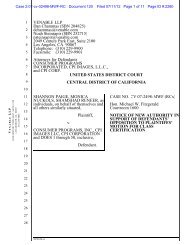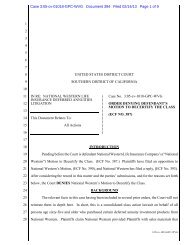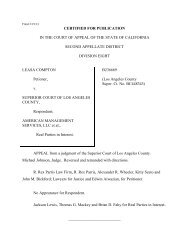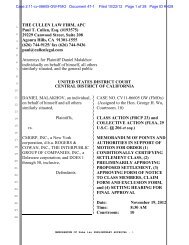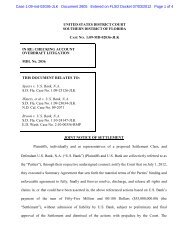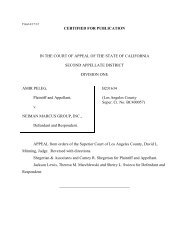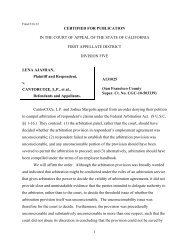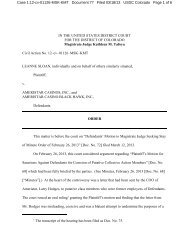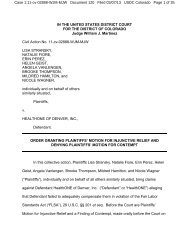KYLE PIPPINS, JAMIE SCHINDLER, and EDWARD LAMBERT
KYLE PIPPINS, JAMIE SCHINDLER, and EDWARD LAMBERT
KYLE PIPPINS, JAMIE SCHINDLER, and EDWARD LAMBERT
Create successful ePaper yourself
Turn your PDF publications into a flip-book with our unique Google optimized e-Paper software.
2012 U.S. Dist. LEXIS 949, *; 18 Wage & Hour Cas. 2d (BNA) 1179<br />
Page 6<br />
Significantly, Federal Rule of Civil Procedure 23's<br />
requirements for class certification do not apply to the<br />
certification of a collective action under the FLSA. Espinoza<br />
v. 953 Assocs. LLC, No. 10 Civ. 5517 (SAS), 2011<br />
U.S. Dist. LEXIS 132098, 2011 WL 5574895 (S.D.N.Y.<br />
Nov. 16, 2011); Vogel v. Am. Kiosk Mgmt, 371 F. Supp.<br />
2d 122, 127 (D. Conn. 2005) ("The prevailing view in<br />
the Second Circuit, <strong>and</strong> in other Circuits, is that actions<br />
... pursuant to section 216(b) of the FLSA are not subject<br />
to Rule 23 requirements <strong>and</strong> principles."); La Belle<br />
Farm, 239 F.R.D. at 368. As a result, the "similarly situated"<br />
st<strong>and</strong>ard is "considerably more liberal than class<br />
certification under Rule 23." La Belle Farm, 239 F.R.D.<br />
at 368.<br />
The fact that Rule 23 st<strong>and</strong>ards are not applied when<br />
conditionally [*20] certifying section 216(a) overtime<br />
classes means that the Supreme Court's recent seminal<br />
class action decision in Wal-Mart Stores, Inc. v. Dukes,<br />
131 S. Ct. 2541, 180 L. Ed. 2d 374 (2011), is in applicable<br />
in the FLSA context. Dukes originated as a Title VII<br />
class action under Rule 23. In Dukes, the Supreme Court<br />
held that Rule 23's "commonality" requirement requires<br />
that the claims of a class of plaintiffs "must depend on a<br />
common contention . . . of such a nature that it is capable<br />
of classwide resolution -- which means that determination<br />
of its truth or falsity will resolve an issue that is central<br />
to the validity of each one of the claims in one<br />
stroke." Id at 2551. To ascertain whether the claims asserted<br />
by the named plaintiffs in a Rule 23 case are sufficiently<br />
"common" <strong>and</strong> "typical" of the claims asserted by<br />
the entire class, a court must often make some preliminary<br />
assessment of the merits of the case. Id at 2551-52.<br />
However, nothing in Dukes speaks to an FLSA case,<br />
where it is well-established that Rule 23's requirements<br />
do not apply, <strong>and</strong> conditional certification is predicated<br />
on the substantial similarity of class members' job situations,<br />
rather than on showings of numerosity, commonality,<br />
[*21] <strong>and</strong> typicality. La Belle Farm, 239 F.R.D at<br />
368.<br />
Furthermore, in Dukes, the resolution of the plaintiffs'<br />
Title VII claims depended on the reasons for each<br />
individual employment decision. There, the Supreme<br />
Court was concerned that, "Without some glue holding<br />
the alleged reasons behind all of Wal-Mart's those decisions<br />
together, it will be impossible to say that examination<br />
of all the class members' claims for relief will produce<br />
a common answer to the crucial question why was I<br />
disfavored." Dukes, 131 S. Ct. at 2552. Here, however,<br />
"the FLSA claims before this Court do not require an<br />
examination of the subjective intent behind millions of<br />
individual employment decisions; rather, the crux of this<br />
case is whether the company-wide policies, as implemented,<br />
violated Plaintiffs' statutory rights." Creely v.<br />
HCR Manorcare, Inc., No. 3:09 CV 2879, 2011 U.S.<br />
Dist. LEXIS 77170, 2011 WL 3794142, at * 1 (N.D. Ohio<br />
July 1, 2011); see also Ware v. T-Mobile USA, F.<br />
Supp. 2d , 2011 U.S. Dist. LEXIS 127091, 2011 WL<br />
5244396, at *6 (M.D. Tenn. Nov. 2, 2011). In other<br />
words, KPMG's alleged policy of classifying all Audit<br />
Associates as exempt is the "glue" that the Supreme<br />
Court found lacking in Dukes.<br />
B. Plaintiffs Have met the Stage One "Similarly Situated"<br />
[*22] St<strong>and</strong>ard<br />
Plaintiffs say that all Audit Associates are similarly<br />
situated insofar as they are misclassified as exempt employees<br />
<strong>and</strong> so were denied overtime benefits in violation<br />
of the FLSA. KPMG responds that that Plaintiffs'<br />
action is not suitable for conditional certification because<br />
whether Plaintiffs <strong>and</strong> potential opt-in plaintiffs are similarly<br />
situated or fall into the professional <strong>and</strong>/or administrative<br />
exemptions to the FLSA's overtime requirements<br />
requires a "fact-intensive inquiry into the character<br />
of the actual work performed by that employee." (Opp'n<br />
at 4-5, 22-29.)<br />
As noted above, the FLSA's overtime requirements<br />
do not apply to "any employee employed in a bonafide<br />
executive, administrative, or professional capacity." 29<br />
U.S.C. § 213(a)(1). Whether Plaintiffs <strong>and</strong> potential<br />
opt-in plaintiffs are exempt from the FLSA's overtime<br />
requirements<br />
turns on whether their individual "primary<br />
duties" involved "the performance<br />
of work requiring advanced knowledge in<br />
a field of science of learning customarily<br />
acquired by a prolonged course of specialized<br />
intellectual instruction," <strong>and</strong>/or<br />
"the performance of office or non-manual<br />
work directly related to the management<br />
or general business [*23] operations of<br />
the employer or the employer's customers,<br />
including the exercise of discretion <strong>and</strong><br />
independent judgment with respect to<br />
matters of significance.<br />
(Opp'n at 4-5 (quoting 29 C.F.R. § 541.300 et seq. (professional<br />
exemption); 29 C.F.R. § 541.200 et seq. (administrative<br />
exemption).) Thus, KPMG argues, as the<br />
statute contemplates, that the question of whether an<br />
employee qualifies as exempt is determined by an individual<br />
employee's specific job duties.<br />
Whether employees qualify <strong>and</strong> professionals or<br />
administrators presents a fact-specific, inquiry. See 29<br />
C.F.R. § 541.700. However, courts here <strong>and</strong> elsewhere<br />
frequently find that this does not preclude conditional<br />
certification of collective actions. Cohen, 686 F. Supp.



